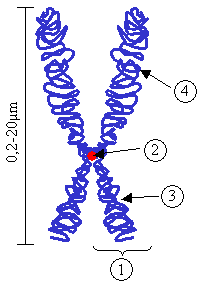Chromosome
The chromosome is the largest iteration of the DNA polymer. It is made up of genes, made up out of both introns and exons, and junk DNA. Chromosomes are nothing more than genetic filing cabinets, and each individual of a species generally has the same genes stored in the same chromosome.
In meiosis, chromosomes "cross over" and produce new variations in the distribution of genes. Genes can also split in two, through duplication of the centromere, a special point at the center of the chromosome, or join together at the tips; this is thought to be a major cause of speciation, and Homo sapiens' 46 chromosomes as opposed to chimpanzees' 48 is a prime example.
Chromosomes, which are stored in the nucleus of every cell, occur in symmetric pairs, one half of each coming from each parent (in sexually reproducing species). These pairs are then split up when forming reproductive cells (gametes), which are then combined to form the new offspring's (relatively) unique chromosome set.
In sexual reproduction, chromosomes are a key part of creating genetically different offspring.
Differing numbers of chromosomes produce infertility, since meiosis will produce odd results in the hybrid of two different-numbered chromosome sets. This explains why some hybrids (i.e. horse X donkey = mule) are (usually)[1] not fertile.
Occasionally, people can have an extra chromosome, leading to a genetic defect called Trisomy. Examples of Trisomy include Down's syndrome (extra chromosome 21), Klinefelter's syndrome (Male with extra X), and everyone's favorite Triple X syndrome.
See also
References
- ↑ A female mule
 , called a "molly", that has estrus cycles and can carry a fetus, can occasionally occur naturally ...
, called a "molly", that has estrus cycles and can carry a fetus, can occasionally occur naturally ...
